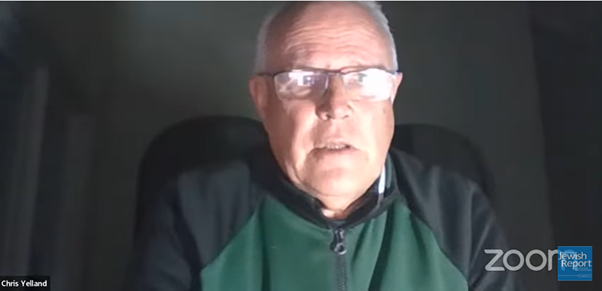
Featured Item

Shedding the crisis – experts get to grips with energy
You’d be forgiven for feeling a certain degree of scepticism when it comes to the reduced loadshedding we’ve been enjoying of late. Experts weighed in on the sustainability of our situation at a SA Jewish Report webinar last week, and discussed why we still need to explore alternatives.
This crisis is driving innovation and change like nothing else, said panellists on the webinar, “What to expect from Eskom this winter and solutions for your life”. Developments include the uptick in solar power and green energy solutions, removing restrictions on independent power producers, as well as looking further afield to countries like China for innovative solutions.
“People have to make a plan – we cannot rely on Eskom,” said panellist Chris Yelland, the country’s top energy analyst. Nonetheless, the meaning of the recent loadshedding relief we’ve experienced has ignited debate around many a Shabbos table.
Yelland attributed the improvement to a number of factors. Loadshedding is essentially the balancing of supply and demand. Historically, he said, we’ve actually had the worst loadshedding in summer. That’s because although demand is higher in winter – albeit not as high as we think – supply is also higher in winter. One of the reasons for this is because most of Eskom’s maintenance is done in summer, which gets the plant in a better state to cope with winter demand.
“Wind power is stronger in winter months,” he said, “especially in coastal areas where it helps significantly. There’s also been a lot of rooftop solar PV and battery storage in commercial, domestic, and agricultural installations, helping to increase supply and reduce the burden on Eskom.
“At the same time, demand has been significantly lower than last year,” said Yelland. Though demand is higher in winter, large industrial energy customers have to pay Eskom approximately three times the price for electricity during June, July, and August, and this is something they simply cannot afford. Energy-intensive industries therefore stockpile during summer and cut back dramatically on production in winter, using those months to do intensive maintenance, thus dramatically reducing demand over winter. “So, though domestic electricity demand is higher, industrial demand brings it down again.” And, as individuals become more energy efficient amidst loadshedding and high prices, more and more are switching from electricity to gas for heating and cooking.
As to whether reduced loadshedding is sustainable beyond and even during the rest of the winter months, Yelland says time will tell. Unplanned breakdowns are an ongoing reality. Yet, though Eskom has been unreliable historically, he hopes its plans to bring onstream four units at the Kusile Power Station by the end of the year will happen as promised. “In addition, next year, another two units, one at Medupi and one at Kusile will come onstream, so that’s all going to add more than 4 000 megawatts to the system, which together makes a big difference as long as there aren’t huge breakdowns and all goes according to plan.” As for summer this year, Eskom predicts a high probability of between stage 2 and stage 6 loadshedding.
Yelland also sees the appointment of Electricity Minister Kgosientsho Ramokgopa, whom he said has brought “new energy” to tackling the crisis, as a positive development. “You have a minister who can cross all traditional boundaries between different portfolios so they can work together to solve the crisis,” Yelland said. Ramokgopa has also brought new ideas to the table as head of the National Energy Crisis Committee, established by President Cyril Ramaphosa.
“With the election looming next year, political will is increasing, driven not by the crisis itself per se but the possibility of loss of electoral support and power in that sense,” Yelland said. While there are some encouraging signs, Yelland stressed that we cannot become complacent. “Ultimately, we need to move away from thinking that government is here to do everything for us,” he said. “We need to start taking ownership of our own future.
“That doesn’t mean to say that we must all rush out and buy a rooftop solar PV and a battery system that can cost about R200 000,” he was quick to add. We need to determine solutions based on our budget, objectives, and unique circumstances.
There are a variety of low or lower-cost solutions from a gas stove and rechargeable globes for cooking and light; to a Wi-Fi UPS to maintain internet supply; to a battery and inverter to power more appliances including Wi-Fi, television; and more. If you do decide solar is right for you, you can either rent a system at a monthly fee that generally ranges below the R2 000 mark, or you can finance solar through your bond, savings, or a bank loan.
There are pros and cons to both options, said panellist Larry Nussbaum, senior technical advisor at technology innovation company DuPont Solutions. “Once you buy a solar system, you have to maintain it. So, if there’s a problem with one of the components, it’s your responsibility to either have a warranty claim or pay for the component to be fixed. The components do age, so even if nothing goes wrong, at some point you’re going to have to upgrade, another downside to buying. The upside, however, is that it’s your system, so you can programme it according to your needs.” You also own the system, so you don’t need to worry about monthly fees.
With a rental, he said, outlays and maintenance are covered by the rental company. “There’s a term to the rental which has to be suitable to your needs. If you cancel and remove the system early, you’ll have to pay a fairly large penalty. But if you’re planning to stick with it, it’s a no-brainer in many ways.”
Though one of the motivations for investing in solar is lower electricity prices, panellists agreed that whatever energy alternative you use, unless you’re completely off grid, ultimately you have to reduce your electricity usage to save on costs.











Ploni
June 29, 2023 at 6:02 pm
And all the solutions, no matter how “low cost”, assume that people are flush with cash and have ample disposable income, which is not the case for most Jewish South Africans.